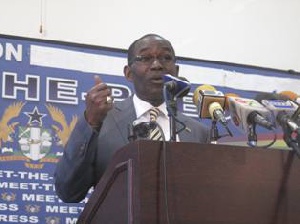- Home - News
- TWI News | TV
- Polls
- Year In Review
- News Archive
- Crime & Punishment
- Politics
- Regional
- Editorial
- Health
- Ghanaians Abroad
- Tabloid
- Africa
- Religion
- Election 2020
- Coronavirus
- News Videos | TV
- Photo Archives
- News Headlines
- Press Release
General News of Friday, 28 September 2012
Source: Daily Guide
Govt Textbooks Smuggled For Sale
A research by governance group, Centre for Democratic Development (CDD) has unearthed a disturbing trend where free government textbooks meant for basic school pupils are increasingly landing on the open market for sale.
Dealers of these government books were not in the least perturbed by the bold ‘Not for Sale’ inscription on them.
Daniel Armah-Attoh, a senior researcher at CDD was on Wednesday, highlighting a research conducted by CDD in October 2011. The research was designed to track the supply and distribution of Mathematics, English and Science (Core subjects) textbooks in public primary schools in Ghana.
The quantum of books sneaked out onto the open market for sale was not readily known, but it could be negatively affecting access to the books by pupils of basic schools. “The observed availability (or inadequacy) of core-textbooks is not surprising especially when all the stakeholders confirmed the sale of government procured ‘Not for Sale’ textbooks in the open market,” Mr. Armah-Attoh remarked.
DAILY GUIDE gathered that publishers contracted to print the textbooks usually printed the books in excess in a bid to siphon some for sale on the open market. Indeed, the CDD confronted the Ghana Educational Service (GES) on this and according to Mr. Armah-Attoh, officials of GES confirmed that publishers usually printed more than their quota, and these extra prints naturally ended up in stationery shops for sale.
According to the CDD report, it was unclear who the real culprits of the illegal sale were, because officials of the GES, the District Education Directorate (DED) and the Heads of schools were flinging accusations at each other for the leakage.
“As to who the culprits of this criminal act are, stakeholders engaged in counter-accusations which implicated all those who play key roles in the procurement and distribution processes from national to school level,” stated the CDD report.
Provision of text books took a bulk of government’s educational expenditure. According to the Education Sector Performance Report of the Ministry of Education (MoE), from 2007 to 2010, over 80 percent of the Ministry’s procurement budget was spent on the acquisition of textbooks at an estimated value of GH¢60million.
In the CDD study, an average of about 9 percent of the total textbooks meant for distribution, were unaccounted for between the MoE and the DED. Also, between the DED and the beneficiary schools, a further average of 1.6 percent was lost. These leakages were usually due to poor handling in transit or systematic diversion for sale on the open market.
When confronted with these realities, Deputy Director-General of the GES, Charles Aheto Tsegah remarked: “There are a lot of issues that are largely beyond our control,” and quickly added that all efforts were being made to rectify the challenges facing the distribution chain of the text books.
The government textbook policy mandated that children in public schools should have access to the core textbooks. However, stakeholders contended that this policy was vastly being undermined by the leakages.
“It is a policy that is really not going down to the grass root,” noted Bright Appiah, executive secretary for educational advocacy group, Ghana Education Coalition.











